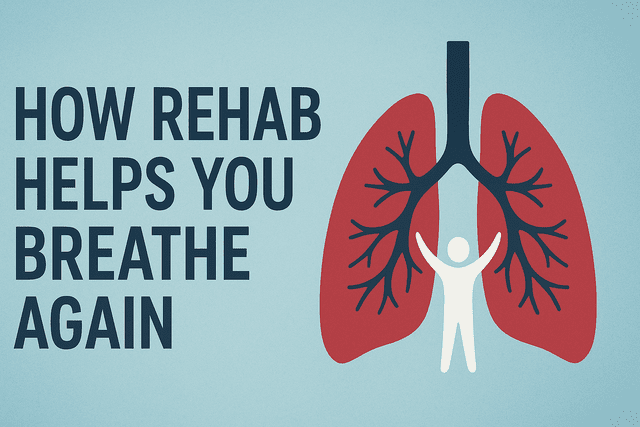
Finding Peace in the Middle of the Mess: How Rehab Helps You Breathe Again
When life starts feeling out of control, it can be hard to even think straight. Everything feels loud. You’re tired, but can’t rest. You want to fix things, but don’t know where to start. That’s what addiction often looks like from the inside. It’s not always wild parties or constant danger—sometimes it’s just chaos in your head, and the feeling that nothing is going to change.
That’s where rehab actually helps—not just by getting someone to stop using, but by giving them space to slow down, think clearly, and start feeling like themselves again.
Table of Content
A Break From the Pressure
Most people don’t realize how much pressure they’re under until they finally step away from it. In everyday life, it’s easy to get stuck in patterns—waking up already stressed, doing things just to numb out, then feeling worse after. It becomes a loop. Rehab breaks that loop.
One of the biggest things rehab does is remove someone from their usual environment. The normal stress, triggers, and people that pull them down aren’t there. For some, that’s the first time in years they’ve been able to just focus on how they feel and what they need without trying to hide it. That quiet, that calm—it matters more than most people think.
In places where recovery is taken seriously, the focus is not just on stopping the substance use. It’s about building a whole environment that feels safe. Some centers even offer personalized, high-end programs in peaceful settings, which can make a huge difference. If someone’s looking for help in the Midwest, a drug rehab in Ohio might be worth checking out—though what matters most is finding a space that actually listens and fits the person, not just the symptoms.
You Get to Think Clearly Again
Drugs and alcohol change how the brain works. Over time, they mess with memory, mood, and the ability to think straight. That’s why someone can be smart and still make choices that don’t make sense. It’s not always about knowing better—it’s about feeling like you can’t do better.
In treatment, the brain gets a chance to rest and start working the way it’s supposed to again. Detox is usually the first step, but it’s not the whole story. After that, people often start therapy or group sessions. That’s when things start making sense again. They can look at what’s been going on and actually figure out what led to the problem—not just the drugs or alcohol, but everything underneath.
People Actually Listen
One of the hardest things about struggling with addiction is feeling invisible or misunderstood. Friends might judge. Family might give advice that doesn’t help. Even doctors sometimes treat the person like a checklist instead of a human being.
In a good rehab center, that changes. People are trained to listen, not just fix. That might sound small, but it’s a huge deal. When someone is finally taken seriously and not brushed off, it helps them open up. It’s easier to talk about what’s been happening, and that’s what makes healing possible.
Treatment centers also work to build real connections. Group sessions, one-on-one therapy, and activities are there to make sure no one feels alone. That sense of connection is what makes someone feel strong again, even on days when everything still feels hard.
Structure Helps More Than You Think
At first, having a set schedule every day might sound boring or strict. But for someone coming out of chaos, structure can actually feel calming. Knowing when meals are, when therapy starts, and when it’s time to rest takes the pressure off. It becomes one less thing to worry about.
That daily rhythm gives people time to recover in both body and mind. Over time, the brain starts to connect small wins with bigger changes. Waking up early, going to sessions, getting through cravings, opening up in a group—it all starts to build momentum. And that’s how someone starts to feel in control again.
It Doesn’t Stop When You Leave
Rehab isn’t magic. It doesn’t fix everything in a few weeks. But it gives people a starting point—a solid one. The next part of recovery happens after leaving. That’s when everything learned inside gets put into practice in the real world.
The best centers don’t just say goodbye at the door. They help people plan for what’s next. That might mean connecting with an outpatient program, a local support group, or continuing therapy back home. Having that support in place makes it more likely that recovery lasts.
Everyone’s Path Is Different
There’s no single way recovery should look. Some people need longer treatment. Some do better with outpatient care. Some need help with mental health too. And that’s okay. The goal isn’t to follow a perfect plan. The goal is to build something that actually works for that person.
That’s why finding the right kind of help matters so much. A place that takes the time to understand what someone actually needs—not just what’s “standard”—can be the difference between staying stuck and actually moving forward.
What Real Peace Feels Like
At some point during recovery, things start to feel different. The brain isn’t racing all the time. Mornings aren’t heavy. There’s space to breathe, to think, to rest. That’s peace. And even though life will still have problems, that peace stays as a reminder of what’s possible.
It’s not about pretending everything is fine. It’s about knowing that feeling okay again is possible, even after everything that’s happened. And once someone feels that peace, they’ll know what to look for when life gets hard again.
A Quick Recap
Rehab gives people a chance to slow down and finally breathe. When someone’s caught in the middle of stress, pressure, or addiction, it’s hard to think clearly or make any kind of real change. That space to step back, rest, and reset the brain can be one of the most important parts of recovery.
Finding the right place matters, too. Everyone wants to feel like they’re being heard, not judged. A rehab center that treats people with respect, listens to what they actually need, and offers real support makes it way easier to open up and start healing. Feeling seen changes everything.
Structure might not sound exciting, but it can help bring life back into balance. Having a routine—one that’s built around recovery—helps rebuild confidence, focus, and calm. Over time, that support helps someone feel more in control of their choices and their future.
Healing takes time. There’s no instant fix. But peace starts to show up in small moments—when the mind quiets down, when things feel less heavy, or when someone realizes they don’t have to fight so hard just to feel okay. That’s what real recovery is about.
And finally, it’s important to remember that not everyone’s path looks the same. Some people need more time, others need different kinds of support. What matters most is finding what works for the person—not what works for everyone else. There’s no one right way to recover, and that’s exactly why the right kind of help makes such a big difference.


